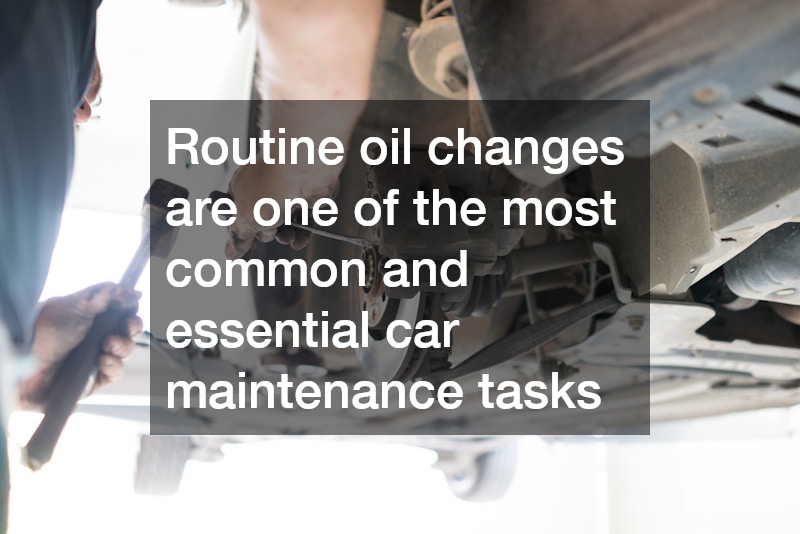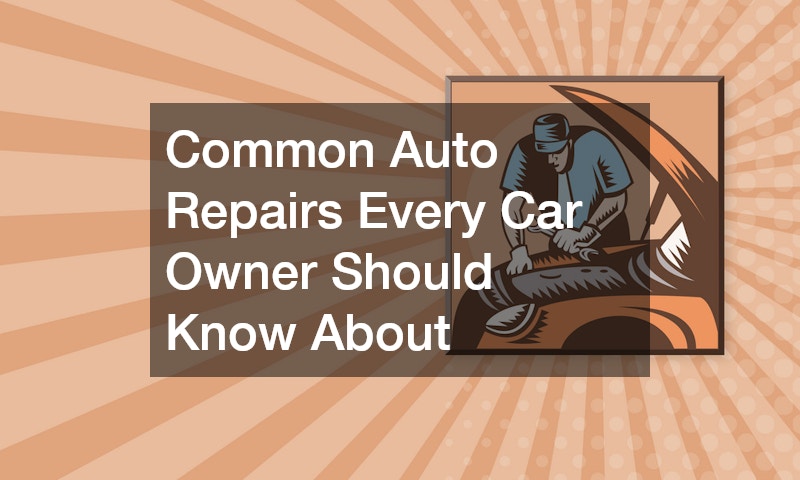Owning a car brings freedom, convenience, and reliability—until something goes wrong. Every driver eventually encounters issues that require a visit to an auto mechanic, whether it’s a strange noise, a warning light, or routine wear and tear. While some repairs are simple enough to handle at home, others demand professional expertise. Understanding the most common auto repairs can help you stay ahead of problems, save money, and keep your vehicle running smoothly for years to come.
Brake Repairs and Replacements
Your braking system is one of the most important safety components in your vehicle. Over time, brake pads, rotors, and calipers wear down due to constant use.
Signs of brake trouble include squealing noises, grinding sounds, or a soft brake pedal. According to Car and Driver, brake pads typically last between 30,000 and 70,000 miles, depending on driving habits and conditions.
If you notice vibrations or your vehicle pulling to one side when stopping, it’s time to have your brakes inspected by a certified auto mechanic. Replacing brake pads and rotors as soon as issues arise can prevent costly damage to other components and, more importantly, keep you safe on the road.
Oil Changes and Fluid Maintenance
Routine oil changes are one of the most common and essential car maintenance tasks. Engine oil lubricates moving parts, reduces friction, and prevents overheating. Over time, oil breaks down and collects dirt, which can cause engine wear or even failure if not changed regularly.
Most experts recommend changing your oil every 5,000 to 7,500 miles, depending on the type of oil and driving conditions. In addition to engine oil, make sure to check and replace other fluids such as transmission fluid, coolant, brake fluid, and power steering fluid. An experienced auto mechanic can perform a full fluid inspection to ensure your vehicle operates efficiently.
Battery Replacement and Electrical System Repairs
Your vehicle’s battery powers everything from the ignition to your lights, radio, and onboard computer. Most car batteries last between three to five years, but factors like extreme weather, short trips, and corrosion can shorten their lifespan. If your car is slow to start, the lights flicker, or you hear clicking noises when turning the key, it’s time to test your battery.
Replacing a car battery is usually straightforward, but electrical system repairs can be more complex. Alternator issues, blown fuses, or faulty wiring require diagnostic testing by a skilled auto mechanic. Ignoring electrical problems can lead to more serious failures down the road.
Tire Repairs and Replacements
Tires endure constant friction and wear, making them one of the most frequently replaced parts on any vehicle. Regular tire maintenance includes checking air pressure, rotating tires, and ensuring proper alignment. Worn or uneven treads can affect handling, fuel efficiency, and safety—especially in wet or icy conditions.
Punctures caused by nails or debris can often be patched, but large holes or sidewall damage usually mean replacement. It’s recommended to inspect your tires monthly and replace them every six years or once tread depth reaches 2/32 of an inch. A trusted auto mechanic can also perform wheel balancing and alignment to extend tire life and improve ride comfort.
Engine Repairs and Tune-Ups
The engine is the heart of your vehicle, and like any complex system, it needs regular attention. Common engine-related repairs include replacing spark plugs, timing belts, and air filters. These components keep your engine running smoothly and help prevent misfires or poor fuel efficiency.
If you notice rough idling, reduced power, or the dreaded “check engine” light, schedule a diagnostic test immediately. Ignoring engine issues can lead to serious damage or complete failure. According to AAA, minor engine problems left unaddressed can cost drivers up to ten times more in repairs later on. Routine tune-ups with a certified auto mechanic can help catch small problems before they escalate.
Exhaust System Repairs
Your vehicle’s exhaust system plays a critical role in directing harmful gases away from the engine and reducing noise. Common problems include rusted mufflers, leaky pipes, or damaged catalytic converters. If you hear loud rumbling noises or smell exhaust fumes inside the car, visit an auto mechanic immediately—these can be signs of a dangerous leak.
A failing catalytic converter can also trigger your check engine light and reduce fuel efficiency. While exhaust repairs can range from minor fixes to full replacements, addressing them promptly can prevent harmful emissions and ensure your vehicle passes inspections.
Suspension and Steering Repairs
Your suspension system provides stability and comfort while driving. It absorbs shocks from bumps and potholes and helps maintain tire contact with the road. Over time, components like shocks, struts, and ball joints wear out, leading to a bumpy ride or poor handling.
If your vehicle feels unstable, leans excessively when turning, or makes clunking noises, it may be time to have your suspension checked. Steering components—such as tie rods and power steering systems—can also develop issues that make your vehicle harder to control. A professional auto mechanic can inspect and replace worn parts to restore proper handling and ride comfort.
Air Conditioning and Heating Repairs
A properly functioning climate control system keeps you comfortable year-round. Common issues include refrigerant leaks, faulty compressors, or clogged filters. If your air conditioner isn’t cooling or your heater blows cold air, it’s best to have an auto mechanic inspect the system.
Ignoring small A/C issues can lead to more expensive repairs later. For instance, a failing compressor can cost hundreds of dollars to replace, while a simple refrigerant recharge or seal replacement is much cheaper if caught early.
Preventive care is always cheaper and easier than major repairs. Regular maintenance appointments, oil changes, and inspections help your auto mechanic catch issues early. Following your vehicle’s manufacturer-recommended maintenance schedule can also extend your car’s lifespan and improve resale value.
When it comes to auto repair, whether it’s a minor brake adjustment or a full engine repair, staying informed about common auto issues empowers you as a car owner. Understanding what your vehicle needs—and when—can make all the difference between a quick fix and a costly breakdown.






